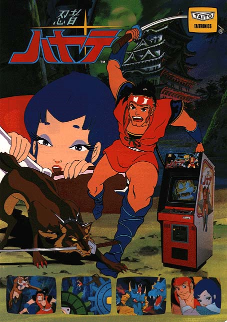Ninja Hayate

Japanese arcade flyer of Ninja Hayate.
|
|
| Developer(s) |
Taito (arcade version) Telenet Japan, Wolf Team (Mega CD version) Ecseco (Saturn/PS1 versions) |
|---|---|
| Publisher(s) | Taito (arcade version) Wolf Team, Renovation, Sega (Sega CD version) Ecseco (Saturn/PS1 versions) |
| Designer(s) | Toei Animation |
| Platform(s) | Arcade, Sega CD, Sega Saturn, PlayStation |
| Release |
Arcade Sega CD
|
| Genre(s) | Action game, interactive movie |
| Mode(s) | Up to 2 players, alternating turns |
| Cabinet | Upright |
| Display | Horizontal orientation, raster, standard resolution |
Ninja Hayate (忍者ハヤテ?) is a 1984 laserdisc video game first developed and released by Taito for arcades in Japan and the United States. The game was later ported to the Sega CD video game console as Revenge of the Ninja in 1994.
The game tells the story of a skilled and daring teenage ninja named Hayate, infiltrating an evil castle in an attempt to rescue a princess he loves. Hayate must survive a collection of deathtraps and defeat a variety of mythological creatures and other adversaries on his quest to save the princess and destroy the castle.
The game draws players to guide Hayate with a joystick for moving him around and one button for using weapons through 15 different stages that take place in feudal Japan-based areas. There are three difficulty levels.
Like earlier laserdisc games such as Don Bluth's Dragon's Lair, Ninja Hayate contains traps and creatures that requires players to dodge or attack them at specific moments, by watching for the warning buzzer (like Dragon's Lair) in addition to flashing objects (e.g. arrows, buttons, light, etc.). If a player makes a mistake, one life decreases, and when players run out of lives, the game ends.
Unlike Don Bluth's laserdisc games, Ninja Hayate is animated with anime drawings by Toei Animation. Another difference is that the game flashes the buttons that need to be pressed directly on the screen. Sometimes it also flashes multiple possible button presses on screen, indicating different paths that the player can take.
...
Wikipedia
